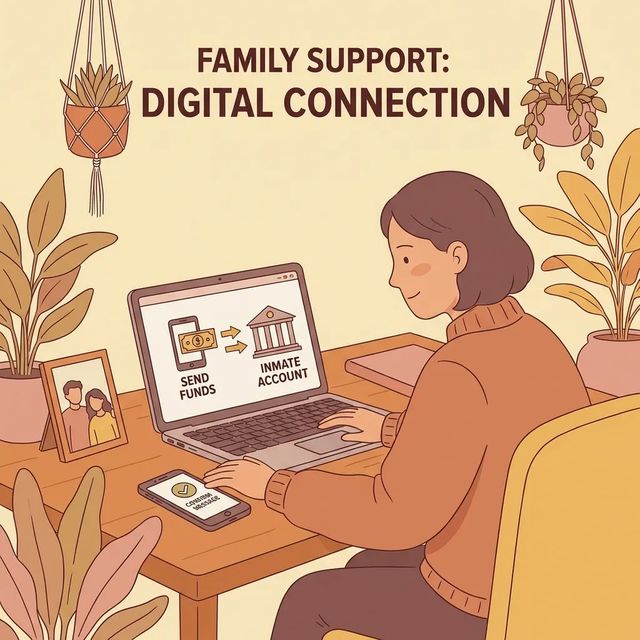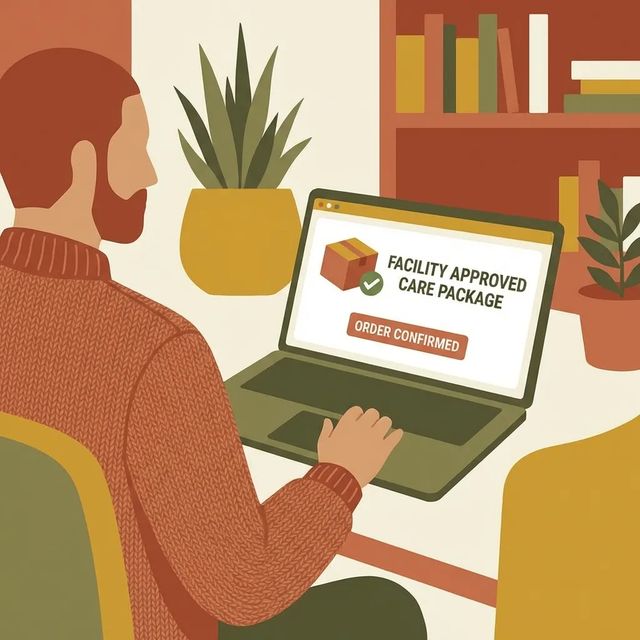MD Reception Diag and Classification
Explore
Find an Inmate at MD Reception Diag and Classification
Search for a loved one and send messages and photos in minutes.

Guides for This Facility

How to Set Up Video Visits at Maryland Reception, Diagnostic and Classification Center (MRDCC)
Video visits can feel overwhelming the first time, but once you know the steps, it's straightforward. This guide walks you through completing the required DPSCS form, meeting eligibility and ID requirements, setting up Microsoft Teams, and avoiding mistakes that can cut your visit short.
Read Guide
Who to Call and How to Pay for Phone Accounts (ConnectNetwork & Lockbox contacts for MRDCC families)
Trying to fund phone calls for someone at MRDCC—or sort out a problem with an existing account? You'll likely end up at one of two places: ConnectNetwork for phone-account help, or the Maryland DPSCS Lockbox for money order deposit questions.
Read Guide
Sending Care Packages to People at MRDCC: How Access Securepak Ordering, Limits, and Taxes Work
If your loved one is at MRDCC, you can't mail a care package yourself—everything goes through Access Securepak. Here's how ordering works, what the quarterly limit means, and what to expect with taxes.
Read GuideAt a Glance
Visitation
- Visitors must complete and return the DPSCS Video Visitation Acknowledgement Form to the institution's administration and not to the inmate.
- All visitors 16 years of age or older must sign the video visitation form and present a valid photo ID at the time of visitation.
- Visitors who are fugitives or who have any open arrest warrants are not permitted to participate in social or video visitation.
Communication
- Visitors must have a Microsoft Teams account to participate in DPSCS video visitation at this facility.
- DPSCS replaced Skype with Microsoft Teams for virtual social visitations and offers virtual visitation as a free service to eligible visitors.
- Three-way calling and taking screen captures of the inmate or screen are prohibited during video visits.
Mail & Letters
- Access Securepak orders for Maryland Reception, Diagnostic and Classification can be placed online, by phone, or by mail.
- Access Securepak limits shipments to a maximum of $100 of product per incarcerated individual per quarter.
- A 6% sales tax applies to hygiene, candy, and processing fees on Access Securepak orders.
Sending Money
- Mail money orders to P.O. Box 17111, Baltimore, MD 21297-0382.
- For inquiries about a cashed money order, provide inmate name, SID, receipt number, date cashed and amount when you call or email.
- ConnectNetwork accepts major credit cards online and via mobile apps 24/7 for deposits and payments.
Inmate Lookup
- The Incarcerated Individual Locator shows housing location and custody status for people in Maryland DOC custody.
- Maryland’s locator requires both the incarcerated person’s first and last name to perform a search.
- If the locator returns no results, the individual may be in federal custody or housed outside Maryland’s jurisdiction.
Contact Info
- MRDCC mailing address is 550 East Madison Street, Baltimore, MD 21202.
- Money orders are processed via a lockbox at P.O. Box 17111, Baltimore, MD 21297-0382.
- Access Securepak is listed as an approved vendor for care packages and can be ordered online, by phone, or by mail.
Facility Info
- Possession or delivery of contraband in a place of confinement is unlawful under Maryland law and violators face imprisonment and fines.
- All visitors 16 years of age or older must sign the video visitation form and present a valid photo ID at the time of visitation.
- Video visitation rules prohibit three-way calling and taking screen captures of the inmate or screen.
Based on official sources and community feedback. Learn how we verify
Topic Overviews
Visitation
To use video visitation at MRDCC, complete the DPSCS Video Visitation Acknowledgement Form and return it to the institution's administration—don't give it to the inmate. Everyone 16 or older must sign the form and bring a valid government photo ID. Fugitives or anyone with an open arrest warrant cannot participate in social or video visitation. The dress code is strict: tube tops, tank tops, see-through clothing, miniskirts, shorts, and tight or form-fitting garments can end your visit immediately and may result in suspended privileges. Leave the visitation area to use the restroom? You won't be allowed back in for that visit. To get started, follow the facility's scheduling process—get on the approved list, create an account if required, then schedule your visit.
Read full guideCommunication
MRDCC uses Microsoft Teams for video visitation, so you'll need a Teams account set up before joining. DPSCS replaced Skype with Teams, and virtual visits are free for eligible visitors. During video visits, three-way calling and screen captures are prohibited. Having trouble with a ConnectNetwork phone account? Call (877) 650-4249. Keep in mind that calls and most video visits are monitored and recorded. Some facilities require visitor accounts with third-party vendors to schedule visits or accept calls.
Read full guideMail & Letters
Care packages for MRDCC go through Access Securepak. You can order online, by phone, or by mail—the vendor provides the address and phone number you'll need. There's a limit of $100 in products per incarcerated person per quarter. A 6% sales tax applies to hygiene items, candy, and processing fees. Need help? Access Securepak has live bilingual representatives Monday–Friday 8:30 a.m.–11:59 p.m. EST and Saturday 11 a.m.–5 p.m. EST. One thing to know: general inmate mail in Maryland facilities is typically processed off-site, scanned, and delivered electronically. Publications and care packages must follow approved-vendor rules, so confirm addressing and vendor instructions before ordering.
Read full guideSending Money
To send money to someone at MRDCC, mail money orders to the official lockbox at P.O. Box 17111, Baltimore, MD 21297-0382. Prefer using a card? ConnectNetwork accepts major credit cards online and through its mobile apps 24/7. If a money order shows as cashed and you need help tracking it, call 410-540-6221, 410-540-6222, or 410-540-6223, or email lockbox@maryland.gov. Have the inmate's name and SID, receipt number, date cashed, and amount ready. For MRDCC account questions, email dpds.inmateaccounts@maryland.gov. Maryland facilities may offer other deposit options—fees and processing times vary by method.
Read full guideCommon Questions
Showing 6 of 23How do I set up video visits at MD Reception, Diagnostic and Classification (MRDCC)?
Complete the DPSCS Video Visitation Acknowledgement Form and return it to MRDCC administration (not to the incarcerated person). You’ll also need to be on the approved visitor list, create an account if required, and schedule through the facility or vendor.
VisitationDo visitors need to sign a form and show ID at MRDCC visits?
Yes. All visitors age 16 or older must sign the video visitation form and present a valid government photo ID at the time of the visit.
VisitationWhat clothing is not allowed during visits at MRDCC?
MRDCC’s dress code prohibits clothing such as tube tops, tank tops, halter tops, see-through clothing, miniskirts/mini-dresses, shorts, and tight/form-fitting garments. If you show up out of dress code, the visit can be terminated and privileges may be suspended.
VisitationCan someone with an active arrest warrant visit an inmate at MRDCC?
No. Visitors who are fugitives or who have any open arrest warrants are not allowed to participate in social or video visitation.
VisitationWhat platform is used for video visits at Maryland Reception, Diagnostic and Classification?
DPSCS uses Microsoft Teams for video visits at this facility. Skype has been replaced by Microsoft Teams for virtual social visitations.
CommunicationCan I take screenshots or add a third person to a video visit at MD Reception, Diagnostic and Classification?
No. The video visitation rules prohibit three-way calling and taking screen captures of the incarcerated person or the screen.
CommunicationMore Guides
Ready to Connect?
Search for your loved one to start communicating today
Did You Know?
This page covers Maryland Reception, Diagnostic and Classification (MD). For video visitation, you'll need to complete the DPSCS Video Visitation Acknowledgement Form and return it to the institution's administration. Don't give the form to the inmate.
This guide is compiled from official facility documentation and community feedback. Learn how we verify
